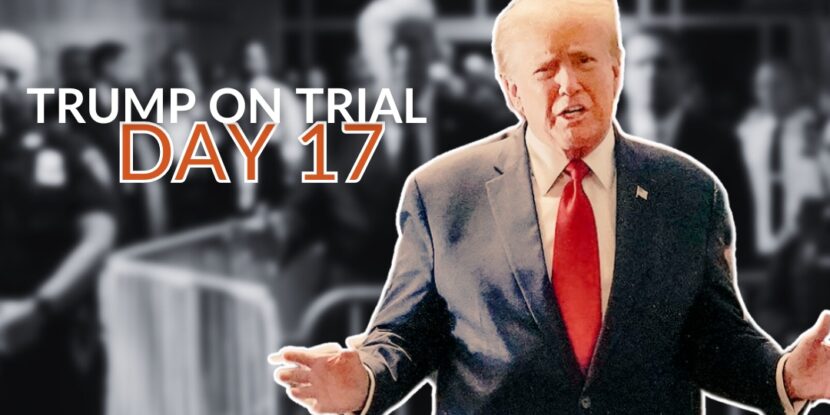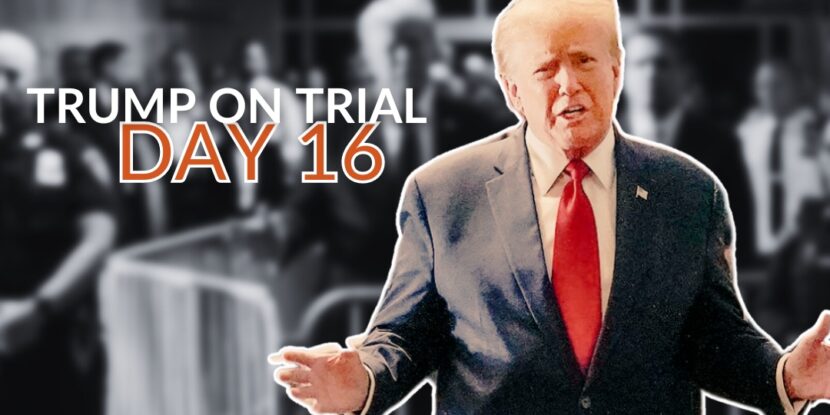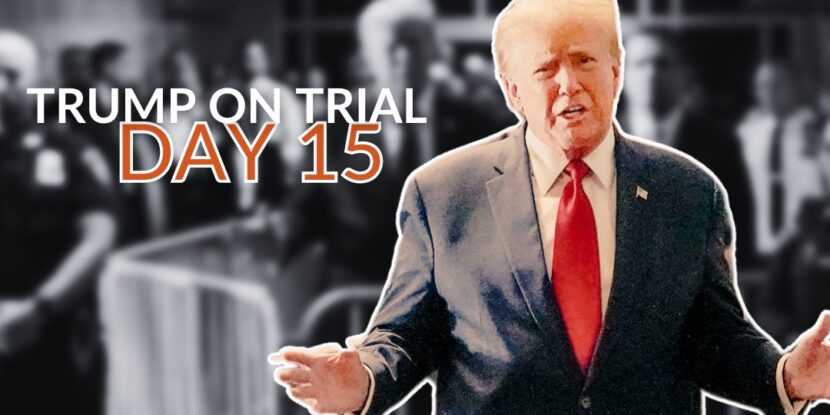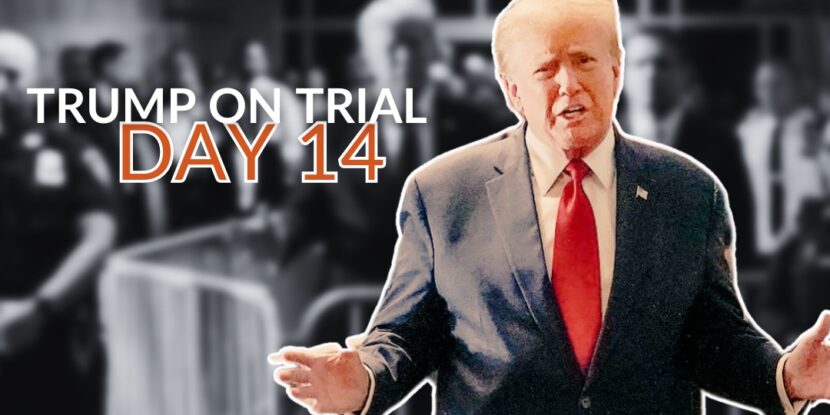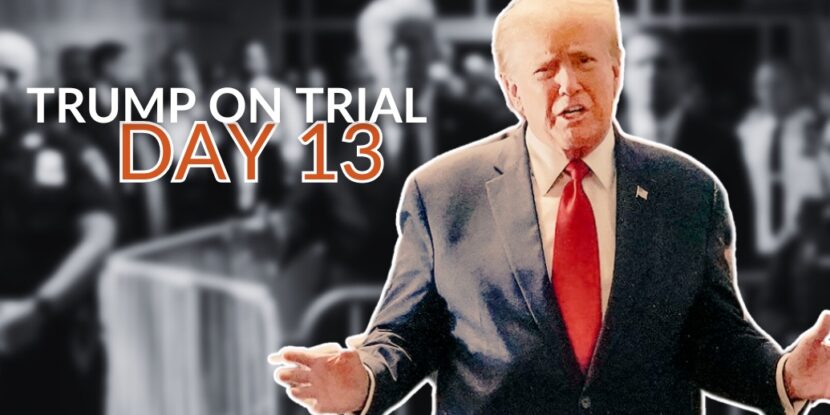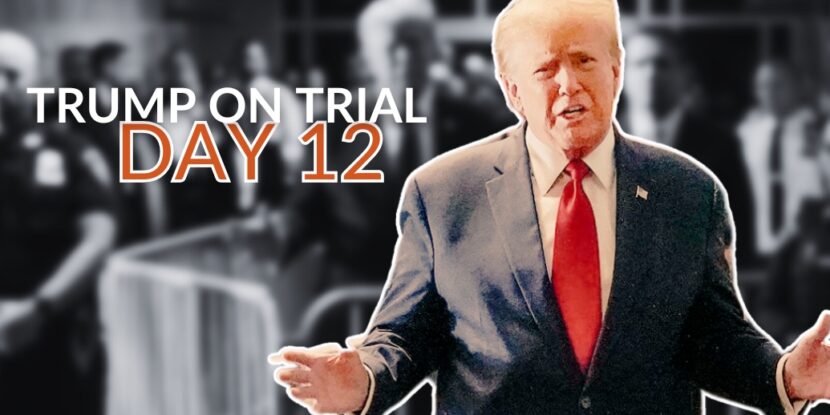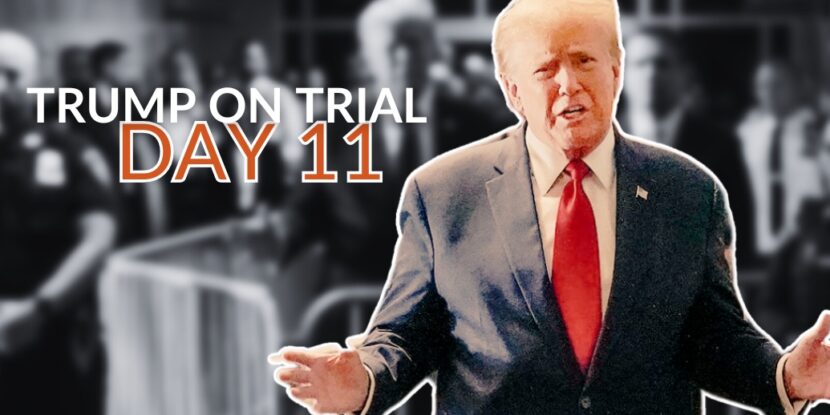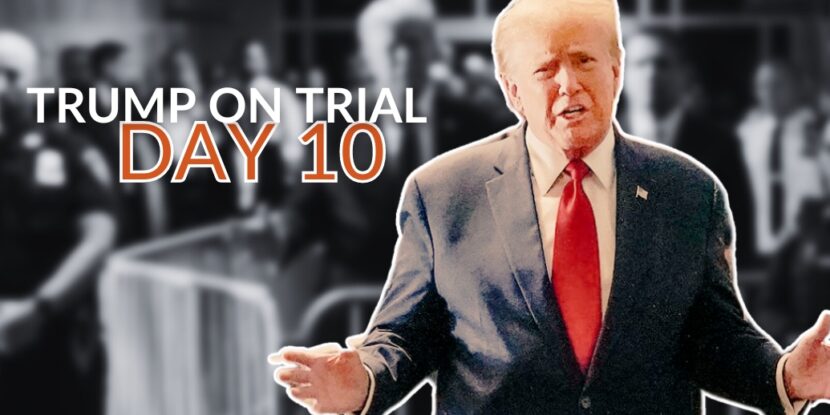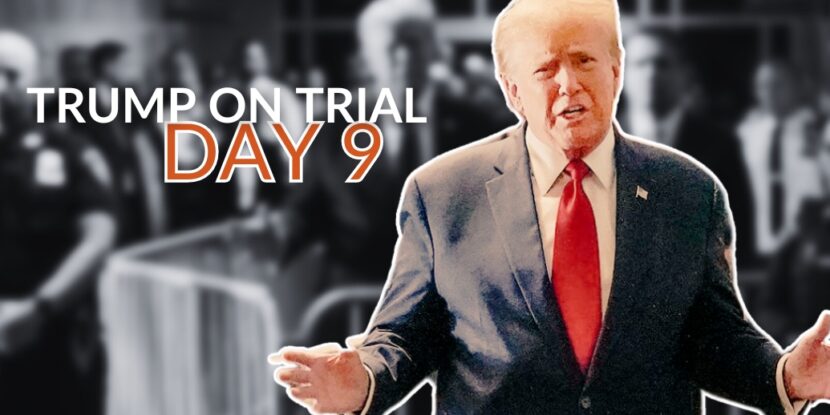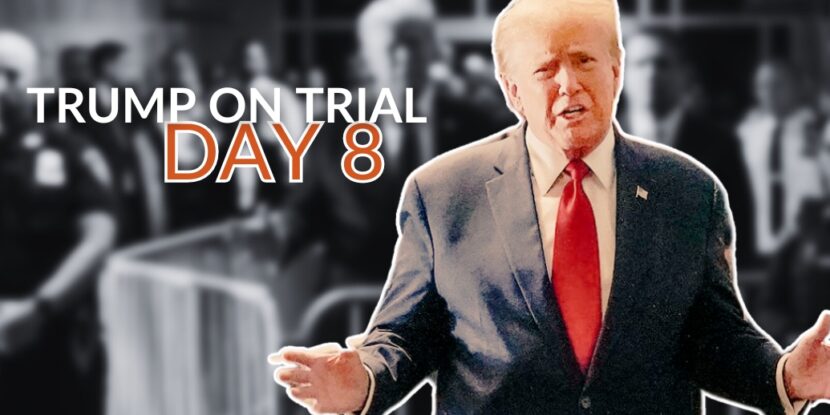Former President Donald J. Trump’s lead counsel, Todd Blanche, handled the defense team’s closing arguments on Tuesday. For over two weeks, a Manhattan jury has heard evidence from prosecutors and the defense alike regarding allegations that former President Trump allegedly made hush money payments to Stormy Daniels as part of an effort to influence the 2016 presidential election.
After long days of testimony and some fairly explosive moments in the courtroom, Blanche’s summation began much like his opening argument a little over two weeks ago, stressing that the prosecution cannot meet the burden of proof.
‘THE BURDEN OF PROOF.’
“I started out by saying something that I’m going to repeat to you right now. It’s as true right now as it was on April 22. And that is President Trump is innocent,” Blanche told jurors. He added: “He did not commit any crimes, and the district attorney has not met their burden of proof — period. The evidence is all in.”
The Trump defense attorney stressed the weakness of District Attorney Alvin Bragg‘s case. Blanche told the jury, “The evidence should leave you wanting more. You should want and expect more than the testimony of Michael Cohen.”
“You should demand more than the testimony of Keith Davidson, an attorney who really was just trying to extort money from President Trump in the lead-up to the 2016 election,” the defense attorney added.
ALL ABOUT THE DOCUMENTS.
As he continued his closing argument, Blanche reiterated that at its core, District Attorney Bragg‘s case is one about documents and nothing else. He stressed that the testimony of Stormy Daniels has no bearing on the case or charges. “This case is about documents. It’s a paper case. This case is not about an encounter with Stormy Daniels 18 years ago,” he told the jury.
Blanche also stressed that the alleged encounter, according to former President Trump, never even occurred in the manner that Daniels claims.
Shifting back to Cohen, Blanche told the jury they must determine if the former President “had anything to do with how payments to Michael Cohen” were recorded or “booked on his personal ledger for his personal account at Trump Tower.” He reiterated to the jury that at the time, Trump wasn’t even living at Trump Tower but was instead serving as President of the United States and living in the White House in Washington, D.C.
“The invoices were all submitted by Michael Cohen,” Blanche argued. He continued: “You’re going to hear me talk a lot about Michael Cohen today, and that should not surprise you. You cannot convict President Trump of any crime beyond a reasonable doubt on the words of Michael Cohen.”
‘COHEN LIED TO YOU.’
While the defense’s closing began with a plodding start, Blanche finally delivered blows to Michael Cohen as the prosecution‘s star witness. “They were lies. Pure and simple,” he said of Cohen’s testimony. Blanche stressed that no evidence was presented that backed up Cohen’s assertions, and even more damning, there were no credible witnesses presented who could corroborate what Cohen claimed.
“There were key conversations, key interactions that he claimed he had with Dylan Howard, with Keith Schiller, Allen Weisselberg. Those are important,” Blanche told the jury before hamming home: “Keith Schiller, Dylan Howard, Allen Weisselberg were not witnesses in this trial.”
The defense attorney continued, explaining to jurors that to convict, the prosecution would have needed to demonstrate that there were false entries on the payment paperwork and that Trump had intended to defraud. “The records were not false, and there was no intent to defraud,” Blanche stressed.
“Cohen typically wrote ‘for services rendered.’ But here’s the thing, and I don’t even think there’s a dispute about this, Cohen was rendering services to Trump as his personal attorney,” Blanche contended. While acknowledging that invoices were at times stapled to checks presented to Trump to sign, the lead defense counsel added: “General practice is not proof beyond a reasonable doubt.”
“Cohen lied to you,” Blanche emphasized to the jury, pausing on each word before repeating: “Cohen lied to you.”
CATCH, KILL, & ELECTION INFLUENCE.
Blanche stressed that the alleged “catch and kill” plot with David Pecker and American Media, Inc. (AMI) was anything but. “This is the same thing AMI has been doing for decades. They had been doing it for President Trump since the 90s,” Blanche argued. He added: “This was good business for them — a mutually beneficial relationship with celebrities.”
Noting that AMI’s flagship publication is little more than a supermarket tabloid, Blanche said: “The idea, even if there was something wrong with it, the idea that sophisticated people like President Trump and David Pecker believed that positive stories in the National Enquirer could influence the 2016 election is preposterous.” He emphasized that the total circulation of the National Enquirer in 2016 was just 350,000.
“Millions and millions of people voted in the 2016 election, so the idea that they really thought that this meeting in 2015 at Trump Tower would ultimately influence the election makes no sense,” Trump’s lead counsel contented before continuing: “The idea that the National Enquirer could criminally influence the election by republishing stories that had already been out there in other forms should make you shake your head. It makes no sense.”
Blanche, now showing the jury a PowerPoint presentation, outlined how the alleged “catch and kill” scheme was never discussed during the August 2015 meeting with David Pecker. “It wasn’t even discussed at the time the conspiracy was formed. No financial discussion. No discussion about catch and kill. Think about that,” he said.
‘AN AXE TO GRIND.’
Closing out his summation, Blanche took full aim at Michael Cohen‘s credibility. The defense attorney argued that Cohen had made the payments to Stormy Daniels of his own accord in a scheme to ingratiate himself with Trump in the hopes he’d receive a high-ranking position in the White House. Hitting on Cohen’s motivation to lie to a court again, Blanche argued: “He told you he didn’t want a job in the administration. But that was a lie, another lie.”
“Mr. Cohen had an axe to grind because he didn’t appreciate what President Trump did and did not do for him,” he added. After reviewing the testimony of Cohen’s former legal adviser, Robert Costello, Blanche told the jury: “I don’t know how many lies is enough lies to reject Mr. Cohen’s testimony.”
Next, Blanche reminded the jury of the pivotal moment where he exposed Cohen for having lied regarding his alleged phone call with Trump regarding the Daniels payment. “That was his sworn testimony. It was a lie… This isn’t a little lie. This was a lie about the charged conduct involving Ms. Daniels,” Blanche said, adding: “He told you he talked to President Trump on October 24 at 8:02 PM, updating him about the Daniels situation. That was a lie, and he got caught red-handed.”
“He’s repeatedly lied under oath. He’s lied to his family. He lied to his wife about the home equity line of credit … he lied to his banker,” Blanche said of Cohen, concluding: “He’s literally like an MVP of liars.”
TEN REASONS FOR REASONABLE DOUBT.
In the conclusion of his summation, Blanche laid out ten reasons for reasonable doubt to the jury that he had covered throughout his closing arguments. The list included:
- Cohen created the allegedly fraudulent invoices, not Trump;
- There’s no evidence Trump knew the invoices were sent;
- There is “absolutely” no evidence that Trump had any intent to defraud;
- The prosecution has not shown an attempt to commit or conceal another crime;
- There is “absolutely” evidence of an agreement to influence the 2016 election;
- AMI would have run the doorman’s story no matter what if it was true;
- Karen McDougal did not want her story published. Thus, it was not a “catch and kill” plot;
- Stormy Daniels‘s allegations were already public well before the 2016 election;
- Prosecutors never present anything showing manipulation of evidence;
- Cohen cannot be trusted: “He’s the human embodiment of reasonable doubt.”
MERCHAN INTEVENES.
Democrat-aligned Judge Juan Merchan, for the most part, gave the defense enough room to make its case in its closing arguments. However, when Blanche, at the end of his summation, told the jury, “You cannot send someone to prison, you cannot convict somebody, based upon the words of Michael Cohen,” the prosecution was quick to object with an irate Merchan sustaining the objection.
“You know that making a comment like that is highly inappropriate. It is simply not allowed. Period. It’s hard for me to imagine that was accidental in any way,” Merchan said, scolding Blanche for making the “outrageous” comment at the end of his summation.
Prosecutor Joshua Steinglass told the judge he believed Blanche’s comments were “a blatant and wholly inappropriate” effort to influence the jury and gain sympathy for former President Trump. Judge Merchan told the court that he’d give a curative instruction to the jury regarding Blanche’s prison comments.
After lunch, Judge Merchan released the instruction: “In the defense summation, Mr. (Todd) Blanche asked in substance that you not send the defendant to prison. That comment was improper, and you must disregard it. In your deliberations, you may not discuss, consider, or even speculate as to matters related to sentence or punishment.”
THE PROSECUTION AT BAT.
Following Blanche’s summation, prosecutor Joshua Steinglass made his closing arguments before the jury. Unlike the defense’s closing, which lasted around two and a half hours, the prosecution announced that its summation would take four to four and a half hours. In reality, it went on for six, with much exasperation felt across the entire court, from jury to journalists, judge to stenographer.
“In his opening, Mr. Colangelo told you that this case, at its core, is about a conspiracy and a cover-up,” Steinglass told the jurors, adding: “We asked you to remember to tune out the noise and to ignore the sideshows. And if you’ve done that, you will see the people have presented powerful evidence of the defendant’s guilt.”
Steinglass’s opening was even slower and plodding than Blanche’s. His summation began with an extensive review of phone records and recall of alleged conversations that Michael Cohen had testified to. “Some of the conversations in this case took place in person, so there wouldn’t be a phone call or recording. The fact that there isn’t a record of a particular phone call does not mean a particular conversation did not take place,” the lead prosecutor told the jury.
THE COHEN PROBLEM.
Steinglass tried to patch some of the holes in the prosecution‘s case that had been exposed in Blanche’s closing. He told the jury that the District Attorney’s case wasn’t reliant on the testimony of disgraced attorney Michael Cohen. “The conspiracy to unlawfully influence the 2016 election — you don’t need Michael Cohen to prove that one bit,” Steinglass insisted.
Instead, the prosecutor told jurors that David Pecker‘s testimony — which was by no stretch a slam dunk for Bragg‘s team — was the truly “utterly damning” evidence. “Mr. Pecker has absolutely no reason to lie here; he still considers Mr. Trump a friend and mentor, and yet his testimony was utterly devastating,” Steinglass continued, claiming that Pecker’s words “eliminates the whole notion that this was politics as usual.”
STORMY DAMAGE CONTROL.
Shoring up another weakness in the prosecution’s case, Steinglass next addressed the testimony of Stormy Daniels. “To be sure, some witnesses want to see Donald Trump convicted,” he told jurors before excusing their motivation, stating: “They’ve been attacked by the defendant on social media.”
Continuing, Steinglass defended Daniels‘s credibility, telling the court: “They’ve shamed her. They’ve tried to suggest her story has changed over the years. It has not, at least not in any way that’s significant.” However, Steinglass conceded: “To be sure, there were parts of her testimony that were cringeworthy.”
Steinglass told jurors that some aspects of Daniels‘s story ring too true to have been fabricated. He pointed to the layout of the hotel room and alleged contents of former President Trump‘s toiletry bag.
THE UNDERLYING CRIME?
Once Steinglass believed he had done enough to put out the fires in the prosecution‘s case set by defense attorney Todd Blanche’s closing, he pressed into the core of Bragg‘s case against Trump.
For over two weeks, the prosecution has avoided describing the underlying crime allegedly committed by former President Trump. Steinglass finally broached the subject in his closing, though he still never exactly stated what federal infraction was committed.
“Michael Cohen is understandably angry. That to date, he’s the one who’s paid the price for his role in this conspiracy,” the prosecutor said. In this simple statement, Steinglass insinuated to the jury that former President Trump is guilty of the same crimes as Michael Cohen. However, while Cohen did plead guilty to a campaign finance infraction, his federal prison stint was due to tax fraud crimes he had committed in an unrelated case.
In essence, Steinglasss hoped to confuse the jury into believing the federal tax charges against Cohen were actually regarding the hush money payments to Stormy Daniels. “Anyone in Cohen’s shoes would want the defendant to be held accountable,” he told the jury, adding: “and when it went bad, the defendant cut him loose, dropped him like a hot potato and tweeted out to the world that Mr. Cohen was a scumbag.”
THE THIEF.
Shifting back to damage control, Steinglass addressed the shocking revelations that Michael Cohen had stolen upwards of $60,000 from the Trump Organization. “It’s true he was never charged with that. He’s also the one who brought it to everyone’s attention,” the prosecutor told jurors.
“Blanche said Cohen stole $60,000 because it was grossed up. So that means the defendant is trying to have it both ways, right? They’re denying the $420,000 was a reimbursement at all,” Steinglass argued. He continued: “Claiming payment for legal services rendered in 2016. But if that’s true, then there was no theft. He’s getting paid for legal services in 2017. They can call him a thief and claim this wasn’t really reimbursement, but not both.”
MAKING UP A CRIME.
Referring to the August 15 Trump Tower meeting, Steinglass said before the court: “The real game changer of this meeting was the catch-and-kill component. And that’s the illegal part. Because once money starts changing hands on behalf of a campaign, that’s federal election campaign finance violations.”
“Blanche said there is nothing wrong with trying to influence an election. It’s called democracy,” Steinglass said before contending: “In reality, this agreement at Trump Tower was the exact opposite. It was the subversion of democracy.”
“Once AMI purchased stories on the candidate’s behalf, those purchases became unlawful campaign contributions,” Bragg’s lead prosecutor said. In an incredibly bizarre moment, Steinglass insisted that the payment made by AMI for the Trump doorman’s false story “was overt election fraud.”
The prosecutor’s assertion mimics that which the American people have already seen with the Congressional Democrats‘ witch hunt against former President Trump over the Russia collusion hoax. They insinuate a crime where there is none and call it election interference. When in reality, the actual election interference is their frivolous prosecution of the former President.
COHEN’S CRIMES OR TRUMP’S?
The next phase of Steinglass’s closing returned to Cohen. Again, the prosecution deployed the strategy of arguing Cohen’s crimes were former President Trump‘s crimes despite never offering convincing evidence that the former President knew of Cohen’s activities.
Steinglass presented the jury with the false paperwork that Cohen had submitted to his bank in creating Resolution Consultants, LLC. The prosecutor told the jury that Cohen had used false business records to open the account. It is important to note that Blanche, in his closing, emphasized that the jury only had Cohen’s word, a serial perjurer, that former President Trump knew of Cohen’s actions.
Pressing further, Steinglass moved through a list of phone calls between Cohen and former Trump Organization CFO Allen Weisselberg. The prosecutor claimed before the court that these calls were evidence enough of the scheme unfolding — though again, Steinglass did not provide evidence connecting Trump to the calls.
Pointing to a single call between Trump and Cohen that occurred before Cohen opened the business account, Steinglass told jurors, “This is damning right here.”
‘BORING!’
When the court took a short break at 5:00PM, former President Trump took to Truth Social to give his review of the prosecution’s closing argument against him. “BORING!” he posted.
NO CRIME? NO PROBLEM!
Following the brief evening break, Steinglass returned to his closing arguments. He asserted the prosecution did not have to prove former President Trump himself knowingly created false business record entries.
“We don’t have to prove that the defendant made and created the false entries himself,” the prosecutor contended before adding that Trump is guilty of creating false business records by virtue of being a part of the “reimbursement scheme. That is causing false entries.”
He next moved to the defense’s claim that the handwritten notes between Weisselberg and Trump Organization controller Jeffrey McConney did not simply address legal services rendered by Cohen. Instead, Steinglass contended: “They are the smoking guns. They completely blow out of the water the defense claim that the payments [are for] legal services rendered. I’m almost speechless that they’re trying to make this argument.”
Again, the prosecution tried to flip the U.S. legal system on its head. Steinglass told jurors it was the defense who had to prove the notes weren’t regarding reimbursement for Cohen‘s hush money payments to Daniels. It is important to note that in U.S. courts, the burden of proof is on the prosecution, not the defense.
PROSECUTION LOSES THE PLOT.
Pushing past 6PM, Steinglass’s summation continued to meander, almost taking the form of a filibuster. He read extensively from books published by Donald Trump, citing quotes about loyalty. From there, the prosecutor then began reading Trump’s social media posts in an effort to highlight how the former President treats those he views as disloyal.
The prosecution has used the loyalty argument on several occasions to insinuate that Trump didn’t need to direct his employees to commit crimes but rather that he created an environment where they understood they needed to, at times, act illegally on his behalf without his direct guidance. Again, this line of argument does not meet the burden of proof required for a conviction in a conventional criminal trial.
Hitting the final stretch, Steinglass, for the third time in his summation, walked the jury through a timeline of events — perhaps this final time not simply to reiterate his point but to remind them of key points of the prosecution’s case in the event they forgot after nearly five hours of testimony. It is honestly impressive the jury was even awake at this point.
After a series of unwelcome jokes about the length of his closing arguments and almost another hour rehashing the prosecution’s case, Steinglass’s summation ended.
You can read The National Pulse’s Day Sixteen trial coverage here, and if you find our work worthwhile, consider joining as a supporter.
show less